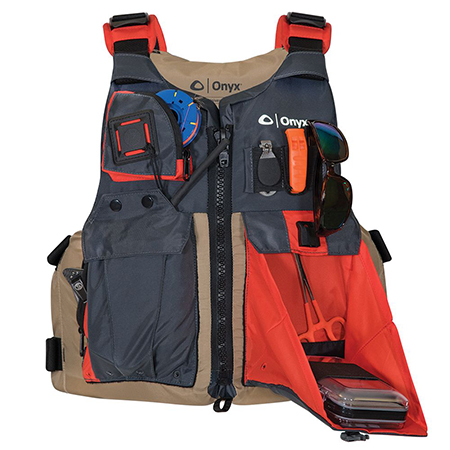Life Jackets, Vests, PFDs & Accessories
About Life Jackets, Vests, PFDs & Accessories
Putting Safety First With Jackets, PFD's and Vest
When it comes to Life-Jackets, we know our customers don't joke around. That's why we offer Coast Guard approved Life-Vests PFDs for every need, whether it be wakeboarding, fishing, to inexpensive back-ups for your boating guests. Our mammoth selection offering a variety of types, sizes, styles, and top brands such as Kent, Mustang, Jet Pilot and Kwik Tek, we guarantee we've got something for you, the family, and even the dog! Looking for matching life-jackets for the entire family, check out our General Purpose Life Jackets Vests. Many of the products in this category have variation sizes to match the different sizing needs of your family members. Concerned about your youngsters? Check out our Kids, Infants Toddler PFD category where we offer a variety of life jackets that use a head flap designed to keep your child's head above the water line.
Life Jackets, Vests, PFDs & Accessories How-Tos
Float Plans, And Why They Are Necessary
A float plan is a written statement that explains the details of a prospective voyage. Every captain should give copies of the statement to a family member, neighbor, and a marina operator on shore. The statement must include any and all details explaining the schedule of the voyage as well as the names of any other crew members, additional equipment, and the type of vessel used. Float Plans are important in the case of an accident or emergency; those who have access to the written plan will be able to provide useful information to authorities or rescue societies.
This does not only apply to boaters who own larger, expensive vessels. If you are planning a boating excursion, you must be prepared for the worst. Here is a list of boater types who should always prepare a float plan:
-Rafters -Kayakers -Jet Skiers -Canoeists -Power Boaters -Sport Fishermen -Water Skiers -Rowers -Sail Boaters -Cruisers -Hunters/Fishermen The owner/captain of the boat takes on the responsibility of filling out a Float Plan. However, this task is not left exclusively to the captain. Anyone boarding the boat that has extensive knowledge of boating safety should include those plans in the Float Plan document. In order to ensure that everything is accounted for in your future Float Plans, the United States Coast Guard has standard guidelines that you may take a look at online. Feel free to refer to this layout on floatplancentral.org:
http://www.floatplancentral.org/classroom/anatomy.htm
Be safe and exercise caution and responsibility when going on voyages for any length or period. Having a Float Plan available to your family, friends, and acquaintances may save your life, as well as the lives of those you may have with you on board.
Simple Safety Ideas while Boating
Boating is a recreational activity that is undertaken by people from all walks of life. Whether is a simple activity such as fishing or an adrenaline pumping one like white water rafting, it is important for boaters to ensure that they adhere to standard safety measures. Boating safety courses and classes are now available all over the country. These courses teach boaters basic safety measures they can take to prevent accidents. They also cover the aspect of dealing with accidents and preventing deaths. At the end of these courses, boaters are certified by their respective institutions having passed the set tests.
For those who cannot afford this class, online sites such as iboats.com Blog and Boating Safety Resource Center have safety tips that you can easily read and familiarize yourself with before embarking on a boating trip. Some of these tips include:
Have a safety checklist
Before embarking on any boating trip, you should have a safety checklist on board. This checklist should have all the safety items you will require on your boat. Check each item on the boat as per the list and replace items that are worn out or missing.
Read the weather
You should be up-to-date with the weather conditions in your location. You should also learn how to observe the physical weather changes incase the radio forecasts are not accurate. Changing tides and clouds are good weather indicators.
Have an assistant
Among your crew, you should pick and assistant who will be able to steer the boat in the event you cannot. If you are with your family, include an extra navigator to help you out in controlling the boat.
Check the boat
The US Coast Guard offers free safety checks that you can take advantage of. As a boater, you should ensure your boat is properly functioning before you take it into the water. You would not like an incident where you get stranded in the middle of the sea or ocean with no one to offer you assistance. Radio and navigation gadgets should also be checked and certified to be in proper working condition.
Use life jackets
Life vestsare the most essential items on a boat. In the case of an accident, these vests will save you from drowning. Statistics show that a majority of victims of boat accidents who die do so because they were not wearing a life vest. It is important to make sure every occupant on a boat has their life jacket on and properly fastened.
Swimming classes
Swimming is another safety measure that boaters should be well aware of. It makes no sense going on a boating trip and being around water when you know you cannot swim. Swimming lessons start from the tender age of 4 so it should not be an excuse for anyone to lack this essential skill.

